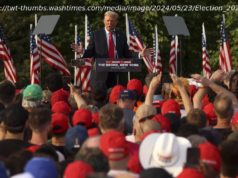Opinion: Top White House economic adviser says business tax cuts in the plan will „trickle down.“ But they aren’t designed to do that.
„T he most excited group out there are big CEOs, about our tax plan,“ says ex-Goldman Sachs President Gary Cohn, who runs the National Economic Council in the Trump White House, in an interview with CNBC’s John Harwood .
Of course they’re excited: The plan offers big tax cuts on business profits. But Cohn says regular people should be excited about the plan, too, because the benefits from business tax cuts will „trickle down“ to them.
Cohn doesn’t seem to realize that „trickle down“ has become a pejorative. It’s a term for a tax plan that’s supposed to produce benefits for the middle class that never materialize.
But even if you were trying to design a trickle-down plan — one that targets its business tax cuts according to supply-side theories of how to grow the economy and boost wages — the Republican tax plan fails.
These business tax cuts are poorly targeted. They are not sufficiently focused on encouraging new business investments.
Many of the business tax cuts in the Republican plan are simply windfalls for people who made business investments in the past — and even if investors are very responsive to incentives, they can’t respond to the bill by investing more in businesses and creating more jobs in the past. Three kinds of business tax cuts
There are three big ways the bill cuts taxes on businesses. Here they are ranked, from most likely to least likely to grow the economy and „trickle down“ as more jobs and higher wages.
Another problem is that the Republican tax plan would significantly grow the national debt. This can be expected to produce a negative trickle-down effect, as higher government debt leads to higher interest rates, lower business investment, and higher future tax rates — possibly on the middle class.
The sad thing about the „trickle down“ argument is that it’s not entirely wrong. Business taxes do affect investment; workers likely do bear a portion of the economic burden of the corporate income tax (though the size of that portion is hotly debated among economists); the right kind of business tax cuts really can grow the economy and benefit workers, especially as part of a plan that doesn’t grow the deficit.
But the key theme in the design of the Republican tax bill is that the business tax cuts are designed to benefit owners of capital first, with workers as an afterthought.
Republican officeholders have been talking surprisingly openly about how angry their major political donors will be if they don’t pass this tax cut package. That makes sense, since the donors would benefit directly from these tax cuts. They don’t need to worry about whether they will really trickle down.






